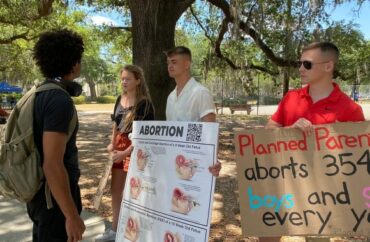
Pro-life leaders say state pushing abortions on students, neglecting family support
California pro-life leaders are raising concerns about coercion and a lack of family support after a report showed more than 400 abortions resulted from a new state law.
The law, which went into effect last year, requires public colleges and universities to provide chemical abortions, or abortion pills, in their student health centers. New York and Massachusetts recently passed similar laws.
In the first six months under the law, 427 chemical abortions were administered on campuses across the state, according to a report by the California Commission on the Status of Women and Girls, published in January.
These included 203 at the University of California campuses, 162 at California State University campuses, and 62 at the UC Law at San Francisco, according to the report.
Unlike surgical abortions, chemical abortions are self-managed, according to the Charlotte Lozier Institute, a pro-life research organization.
The method is used up to 10 weeks of pregnancy and requires two drugs prescribed by a medical professional. The first, mifepristone, blocks the hormone progesterone, causing the death of an embryo or fetus. The second, misoprostol, is taken between 24 and 48 hours later to induce contractions and expel the unborn child’s body.
The new law shows how the state’s priorities need adjusting, according to Mary Rose Short, director of California Right to Life.
Democrat lawmakers should be “working to make our state affordable for families,” Short told The Fix in a recent email.
Instead, they passed a law to “pay for women to come from out of state for abortions in California, created an abortion corps in our health department, and removed all civil and criminal penalties for anyone assisting a mother in achieving the death of her unborn child at any gestation,” she said.
Short said the abortion industry likes the abortion drug method, as opposed to surgical abortion, “because they turn the pregnant mothers into abortionists.”
“Abortion purveyors are still paid, but they don’t have to get their hands dirty by doing the actual killing or dealing with the disposal of the babies’ bodies,” she said.
MORE: Catholic U. San Diego won’t explain why it helps students get abortions
Short also expressed concerns about young women being coerced into abortions because abortion pills have become so easily available.
“The availability of these lethal abortion drugs has led to countless tragedies when men slipped them to pregnant mothers and killed their children,” she told The Fix.
Kristi Hamrick, a spokesperson for Students for Life of America, told The Fix her organization fought to keep the law from passing and continues to fight for its repeal.
Among other things, Students for Life is working “for passage of the Protecting Life on College Campuses Act to get the pills removed” and educating students about the dangers of abortion pills, she said.
The risks that Hamrick referred to include severe bleeding, blood clots, body shakes, nausea, diarrhea, fever, chills, and infection, as well as undetected ectopic pregnancy, which can cause death. A study by the Charlotte Lozier Institute found that chemical abortions are significantly more likely than surgical abortions to result in emergency room visits.
Meanwhile, some abortion advocates responded to the new data by pointing to research suggesting the numbers should be higher, according to the LAist.
One reason they posed is universities may be “underserving” students’ “abortion needs” by failing to notify them the pills are available, the report states.
Winnie Xu, a UCLA student and co-founder of the Preserve Abortion Access California Task Force, told City on a Hill Press, a news site run by UC Santa Cruz students, “The more people that know about this service the more people that will access it, the better.”
However, Greg Burt, vice president of the California Family Council, said he finds it sad that abortion supporters “were hoping” more students would kill their unborn children.
“Colleges should be providing services that encourage women to give birth to their children, not trying to make killing their children the easiest option,” he told The Fix via email late last month.
The Fix contacted the California Commission on the Status of Women and Girls twice within the past month asking for comment about the new abortion data and the campus abortion law. The Fix also contacted the California Coalition for Reproductive Freedom for its reaction to the data. Neither organization responded to the requests for comment.
MORE: University of Maryland terrorism center database includes peaceful pro-lifers
IMAGE: California Right to Life/Facebook





Please join the conversation about our stories on Facebook, Twitter, Instagram, Reddit, MeWe, Rumble, Gab, Minds and Gettr.